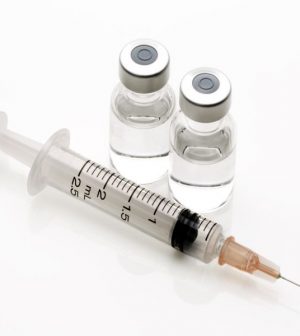- Recognizing the Signs of Hypothyroidism
- 10 Strategies to Overcome Insomnia
- Could Artificial Sweeteners Be Aging the Brain Faster?
- Techniques for Soothing Your Nervous System
- Does the Water in Your House Smell Funny? Here’s Why
- Can a Daily Dose of Apple Cider Vinegar Actually Aid Weight Loss?
- 6 Health Beverages That Can Actually Spike Your Blood Sugar
- Treatment Options for Social Anxiety Disorder
- Understanding the Connection Between Anxiety and Depression
- How Daily Prunes Can Influence Cholesterol and Inflammation
COVID Vaccines Safe for Organ Transplant Recipients: Study

Here’s some good news for people who’ve had solid organ transplants and have weakened immune systems: mRNA coronavirus vaccines are safe for these vulnerable folks, new research shows.
The study included 187 transplant recipients who received an initial dose of either the Moderna or Pfizer mRNA vaccines between Dec. 16, 2020 and Jan. 16, 2021.
The participants, median age 48, were recruited for the study by invitation through their transplant centers or social media. Their transplants had occurred a median of six years earlier and all were taking immunosuppression drugs to prevent rejection of their transplanted organs.
The participants included kidney (52%), liver (19%), heart (14%), lung (9%), kidney and pancreas (3%), and other multi-organ (3%) recipients.
In the week after they received their COVID-19 vaccine, none of the patients were diagnosed with COVID-19. Rates of adverse systemic reactions to the vaccines were low — for example, chills (9%) and fever (4%) — and similar to those in large randomized clinical trials that assessed the safety of the vaccines.
Many of the participants reported local reactions after vaccination, including mild pain at the site of inoculation (61%), mild redness (7%) and mild swelling (16%).
There were no cases of organ rejection, which is a concern in this group of patients, according to the study published online recently in the journal Transplantation.
“We hope to further this research by exploring any unexpected safety issues with long-term follow-up studies of these patients in the future,” senior study author Dr. Jacqueline Garonzik Wang, an associate professor of surgery at Johns Hopkins University School of Medicine in Baltimore, said in a Hopkins news release.
Study co-author Dr. Dorry Segev, professor of surgery and epidemiology, and director of Hopkins’ Epidemiology Research Group in Organ Transplantation, added that “these insights are critical toward protecting the lives and quelling the fears of transplant recipients who might be hesitant about getting the SARS-CoV-2 vaccines.”
More information
The American Society of Transplantation has more on COVID-19 vaccines.
SOURCE: Johns Hopkins Medicine, news release, Feb. 5, 2021
Source: HealthDay
Copyright © 2026 HealthDay. All rights reserved.










